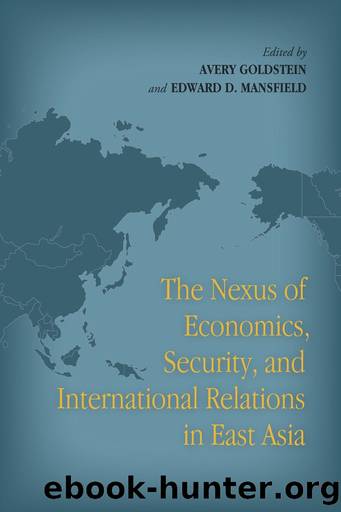The Nexus of Economics, Security, and International Relations in East Asia by Avery Goldstein & Edward Mansfield

Author:Avery Goldstein & Edward Mansfield [Goldstein, Avery & Mansfield, Edward]
Language: eng
Format: epub
Tags: Political Science, General, Security (National & International)
ISBN: 9780804782739
Google: QIB2swEACAAJ
Goodreads: 14935884
Publisher: Stanford University Press
Published: 2012-08-29T11:38:51+00:00
6 The Cult of Energy Insecurity and Great Power Rivalry Across the Pacific
Danielle F. S. Cohen and Jonathan Kirshner
Most states that are dependent on imported energy fret about the domestic and international political consequences implied by that dependenceâsupply disruptions can wreak havoc with the economy, rattling support for the regime in power, and they can expose countries to national security threats by limiting their ability to fight wars or by leaving them vulnerable to extortion. States, perhaps not unrealistically, view energy as the lifeblood of their economies and, somewhat less rationally, worry about the precariousness of that flow the way one would worry about a jugular vein in a knife fight.
Great powers do more than fret. They seek, proactively and often aggressively, to do whatever it takes to ensure energy security. States have clashed over energy resources throughout modern history, and since the Second World War, the Persian Gulf region has attracted the attention of great powers as a consequence of the massive oil reserves to be found there (Yergin 1991; Barnhart 1987; Painter 1986). In contemporary politics, several factors have led some analysts to expect an increasingly dangerous clash over energy security among the United States, China, and Japan (Klare 2004: esp. 175â179; Kleveman 2003: 9, 98, 101, 192, 263). These concerns derive from claims, especially in popular accounts, that global petroleum production will soon reach peak levels, after which it will gradually diminish over time, while at the same time, global demand for oil is on the rise, with new actors in emerging economies (like India and China) elbowing their way for space at the table (Goodstein 2005; Roberts 2004; Deffeyes 2001). Also alarming was the doubling of oil prices from 2003 to 2006, and their doubling again from 2006 to 2008, a seemingly inexorable rise that finally crested and receded as a result of the global economic crisis. Finally, there is the distinct salience of energy security for three principal states hungry for the worldâs oil: Japan, which depends on imports, by sea, for virtually all the 4.4 million barrels of oil it consumes each day; China, a late entrant to crowded world markets with soaring demand for imported oil; and the United States, the elephant at the watering hole. Even in 2009, after two years of dismal economic growth, the United States still consumed more oil than the total consumption of the next four biggest players, and it remained the worldâs dominant oil importer, bringing in more foreign oil than China and Japan combined (Energy Information Administration 2009c, 2009d).
Nevertheless, we argue that energy insecurity is a myth; that is, concerns by states that they will not be able to ensure adequate energy supplies, thus presenting leaders with economic and political crises, are misguided. States need not be worried about this problem, with the exception of a few unlikely scenarios (about which more below), especially if short-term disruptions (easily managed by relatively modest contingency planning) are excluded from consideration. However, and this is a big however, although
Download
This site does not store any files on its server. We only index and link to content provided by other sites. Please contact the content providers to delete copyright contents if any and email us, we'll remove relevant links or contents immediately.
Harry Potter and the Goblet Of Fire by J.K. Rowling(3025)
Never by Ken Follett(2873)
Shadow of Night by Deborah Harkness(2710)
Ogilvy on Advertising by David Ogilvy(2677)
Zero to IPO: Over $1 Trillion of Actionable Advice from the World's Most Successful Entrepreneurs by Frederic Kerrest(2376)
The Man Who Died Twice by Richard Osman(2290)
Machine Learning at Scale with H2O by Gregory Keys | David Whiting(2267)
Book of Life by Deborah Harkness(2259)
How Proust Can Change Your Life by Alain De Botton(2256)
My Brilliant Friend by Elena Ferrante(2218)
0041152001443424520 .pdf by Unknown(2214)
The Tipping Point by Malcolm Gladwell(2200)
How to Pay Zero Taxes, 2018 by Jeff A. Schnepper(2095)
Will by Will Smith(2033)
Purple Hibiscus by Chimamanda Ngozi Adichie(1978)
Hooked: A Dark, Contemporary Romance (Never After Series) by Emily McIntire(1932)
Borders by unknow(1779)
Rationality by Steven Pinker(1761)
Daughter of Smoke and Bone by Laini Taylor(1738)
